
Quantitative Finance and Economics
Scope & Guideline
Advancing Knowledge in Quantitative Finance and Economics
Introduction
Aims and Scopes
- Quantitative Financial Analysis:
The journal emphasizes rigorous quantitative methods to analyze financial data, including econometric modeling, statistical analysis, and computational techniques. - Market Dynamics and Volatility:
A core focus is on understanding market behaviors, including volatility transmission, spillover effects, and the impact of macroeconomic factors on financial markets. - Algorithmic and Machine Learning Approaches:
The journal showcases research integrating machine learning and algorithmic trading strategies, reflecting the growing importance of technology in finance. - Economic Policy Impacts:
Research often investigates the effects of economic policies on financial markets, exploring themes such as economic uncertainty, taxation, and governance. - Comparative and Cross-Regional Studies:
The journal frequently publishes comparative studies across different regions, particularly focusing on emerging markets and their connections to developed economies.
Trending and Emerging
- Integration of Machine Learning and Big Data:
There is a significant increase in research employing machine learning techniques and big data analytics to enhance financial modeling and forecasting accuracy. - Environmental, Social, and Governance (ESG) Factors:
The incorporation of ESG considerations into financial analysis is gaining prominence, reflecting a growing concern for sustainable investing and corporate governance. - Cryptocurrency and Digital Finance:
Research exploring the volatility and market dynamics of cryptocurrencies, as well as the implications of central bank digital currencies, has surged in response to the rapid development of digital financial instruments. - Cross-Market Interdependencies:
Emerging themes include the exploration of interdependencies between various financial markets, particularly in the context of global economic events and crises. - The Role of Macroeconomic Indicators:
There is a rising interest in the relationship between macroeconomic indicators and financial market performance, focusing on how these indicators influence investment decisions and risk assessment.
Declining or Waning
- Traditional Financial Models:
There is a noticeable decline in papers utilizing conventional financial models without the integration of newer methodologies such as machine learning or advanced econometrics. - Single-Country Analyses:
Research focusing solely on single-country analyses seems to be waning, with a shift towards more comparative and cross-regional studies that provide broader insights. - Descriptive Studies:
Papers that primarily offer descriptive analyses without substantial quantitative modeling or innovative methodologies are becoming less frequent.
Similar Journals

JOURNAL OF ECONOMICS AND FINANCE
Pioneering research for a dynamic economic landscape.JOURNAL OF ECONOMICS AND FINANCE, published by SpringerNature, is a leading academic journal that has been addressing critical issues in the fields of economics and finance since its inception in 1992. With an ISSN of 1055-0925 and an E-ISSN of 1938-9744, this journal offers scholars a platform to share their groundbreaking research and insights, contributing to the advancement of economic theory and financial practices. Although it operates under a traditional access model, the journal maintains a reputable standing within the academic community, evidenced by its 2023 Quartile ranking of Q3 in both Economics and Econometrics as well as Finance. Its Scopus ranking further reflects its relevance, securing positions of #355/716 and #159/317 in the respective categories. The journal aims to foster a comprehensive understanding of economic dynamics and financial innovations, making it an invaluable resource for researchers, educators, and practitioners who seek to explore contemporary trends and challenges within these disciplines.
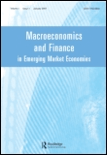
Macroeconomics and Finance in Emerging Market Economies
Pioneering Research for Tomorrow’s Financial ChallengesMacroeconomics and Finance in Emerging Market Economies, published by Routledge Journals, Taylor & Francis Ltd, is a vital scholarly platform dedicated to advancing the understanding and exploration of macroeconomic and financial issues pertinent to emerging market economies. With an ISSN of 1752-0843 and an E-ISSN of 1752-0851, this journal addresses the pressing challenges and dynamic transformations faced by economies in transition, making a significant contribution to the fields of economics and finance. Although currently lacking an open access option, this publication provides a rigorous peer-reviewed outlet for original research, comprehensive reviews, and theoretical advancements. With its convergence years spanning from 2010 to 2024, and retaining a respectable Q3 quartile ranking in both Economics and Econometrics as well as Finance, the journal serves as an influential resource for researchers, professionals, and students engaged in understanding the complexities of macroeconomic policies and financial practices within these rapidly developing regions. Join the discourse and enhance your understanding of current trends and future directions in macroeconomic and financial research within emerging markets.
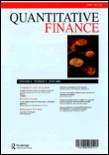
QUANTITATIVE FINANCE
Exploring innovative solutions in finance and econometrics.QUANTITATIVE FINANCE, published by Routledge Journals, Taylor & Francis Ltd, stands at the forefront of academic research in the dynamic fields of finance, economics, and econometrics. With a strong commitment to disseminating cutting-edge research, this esteemed journal, which has been published since 2001 and continues to thrive with an anticipated convergence until 2024, occupies a prestigious Q1 ranking in Economics, Econometrics, and Finance and a Q2 ranking in Finance as of 2023. It serves as an essential platform for interdisciplinary studies, aiming to bridge theoretical approaches and practical applications in quantitative methods. Researchers, professionals, and students are provided access to a wealth of high-quality articles that contribute to the ongoing discourse and advancements in these fields. As the journal continues to impact its community, QUANTITATIVE FINANCE remains an invaluable resource for those seeking to stay at the cutting edge of financial research and its applications globally.
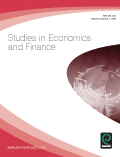
Studies in Economics and Finance
Advancing knowledge in economics and finance.Studies in Economics and Finance is a distinguished journal published by Emerald Group Publishing Ltd, based in the United Kingdom. With an ISSN of 1086-7376 and an E-ISSN of 1755-6791, this journal has been a significant contributor to the fields of economics, econometrics, and finance since its inception, with coverage ranging from 1977 to the present. Ranked in the second quartile (Q2) for 2023 in its relevant categories, it holds a reputable position within the 83rd percentile in the general economics, econometrics, and finance fields according to Scopus rankings. This journal aims to disseminate cutting-edge research that addresses key issues and emerging trends in the economic and financial landscapes, fostering dialogue among scholars, practitioners, and policymakers. Although it does not operate under an Open Access model, Studies in Economics and Finance continues to be an essential resource for advancing knowledge and providing insights that are crucial for understanding complex economic behaviors and financial systems.
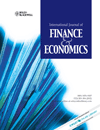
INTERNATIONAL JOURNAL OF FINANCE & ECONOMICS
Pioneering Theories for Tomorrow's EconomistsInternational Journal of Finance & Economics, published by Wiley, is a premier academic journal that serves as a vital resource for researchers and professionals in the fields of finance, accounting, and economics. With an impressive impact factor and a reputation for excellence, the journal is recognized in the 2023 Scopus rankings, placing in the top quartiles across multiple categories, including Q2 in Accounting, Economics, and Finance. The journal has been a significant contributor to academic discourse since its inception in 1996, with its converged years extending to 2024, thereby ensuring the continuous advancement of knowledge in these critical areas. Although it operates under a traditional subscription model, its comprehensive articles provide insightful analyses, empirical research, and theoretical advancements that cater to a diverse audience—from seasoned scholars to emerging students in the field.
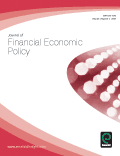
Journal of Financial Economic Policy
Connecting researchers and practitioners in the realm of financial economics.Journal of Financial Economic Policy is a premier academic journal published by EMERALD GROUP PUBLISHING LTD, focusing on the intersection of finance and economics. Through rigorous peer-reviewed research, the journal aims to advance understanding of financial policies and economic frameworks, addressing critical issues faced by financial markets and institutions. With an ISSN of 1757-6385 and an E-ISSN of 1757-6393, it serves as a reputable source of information for researchers, professionals, and students alike. The journal operates within the United Kingdom and is recognized for its contributions to the fields of economics and finance, achieving a Q3 category ranking in both disciplines as per the 2023 metrics. This places it within the top half of journals in its category according to Scopus ranks, demonstrating a solid impact in the academic community. Although it is not an open-access journal, the insights and analyses published are invaluable for those seeking to grasp complex financial phenomena and develop effective policies. The journal’s scope encompasses a wide range of topics relevant to contemporary finance and economic strategies, making it an essential resource for ongoing scholarly discourse and practical applications.
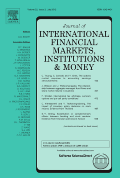
Journal of International Financial Markets Institutions & Money
Connecting Theory and Practice in FinanceThe Journal of International Financial Markets, Institutions & Money, published by Elsevier, serves as a leading platform for the dissemination of high-quality research in the fields of finance, economics, and econometrics. With an impressive impact factor reflected in its status as a Q1 journal in both categories for 2023, it ranks among the top journals, positioned at #47 out of 317 in Finance and #111 out of 716 in Economics. This journal offers a unique focus on the interplay between financial markets and institutions on a global scale, making it an essential resource for scholars, practitioners, and students alike. The journal welcomes innovative theoretical, empirical, and applied research, contributing to an exciting dialogue that shapes the future of international finance. For researchers looking to publish their findings, this journal is committed to rigorously engaging with contemporary financial phenomena, positioning itself as a vital cornerstone of academic and professional discourse.

Algorithmic Finance
Revolutionizing Financial Analysis with Algorithmic PrecisionAlgorithmic Finance, published by IOS PRESS, is a pivotal journal devoted to the burgeoning field of finance through the lens of computational methodologies. With its ISSN 2158-5571 and E-ISSN 2157-6203, the journal has been a platform for scholarly articles exploring the intricate interactions between algorithms and financial systems since its establishment in 2011. Although it currently resides in the Q4 quartile across several categories, including Computational Mathematics and Finance, it serves as a critical resource for researchers seeking to innovate within the financial landscape using algorithmic techniques. The journal is particularly relevant for an audience of academics, finance professionals, and graduate students, providing insights that combine quantitative analysis with economic theory. Located in Amsterdam, Netherlands, Algorithmic Finance aims to foster an interdisciplinary dialogue, making significant strides in the analytical approaches to financial markets while adhering to rigorous scientific standards. With its growing archive of research, the journal aspires to enhance the understanding of algorithmic strategies in finance, thereby encouraging further inquiry and application in real-world scenarios.

Quantitative Economics
Transforming economic research with impactful quantitative findings.Quantitative Economics is a leading open-access journal published by WILEY, dedicated to advancing the field of economics through rigorous quantitative analysis. Established in 2010 and based in the United States, this influential journal boasts an impressive Q1 rating in the 2023 category of Economics and Econometrics, reflecting its high impact and quality within the field. With a Scopus ranking of #222 out of 716 in the Economics and Econometrics category, it sits comfortably in the 68th percentile, underscoring its relevance to researchers and professionals alike. The journal accepts a wide range of submissions, including original research articles, methodological advancements, and comprehensive reviews, which contribute to the understanding and application of quantitative methods in economic research. By providing immediate open access to all published articles, Quantitative Economics ensures that vital findings are readily available to academics, policymakers, and students across the globe, enhancing collaboration and innovation within the discipline.
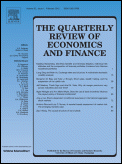
QUARTERLY REVIEW OF ECONOMICS AND FINANCE
Empowering Research, Shaping Economic DiscourseQuarterly Review of Economics and Finance is a renowned academic journal published by Elsevier Science Inc. that focuses on key advancements in the fields of economics, econometrics, and finance. With a commitment to fostering scholarly dialogue, this journal provides a platform for researchers and practitioners alike to disseminate innovative ideas and empirical research, contributing to the economic discourse since its inception in 1992. Recognized for its quality, the journal holds an impressive Q2 ranking in both Economics and Econometrics and Finance, with Scopus rankings placing it in the 81st percentile, underscoring its relevance and impact within the scholarly community. While the journal operates under a subscription model, it boasts a global readership and is accessible to professionals and students seeking insightful and rigorous analyses of contemporary economic issues. With its clear objectives of expanding knowledge and influencing practice, the Quarterly Review of Economics and Finance serves as an essential resource for anyone committed to understanding the dynamics of economics and finance in the modern world.